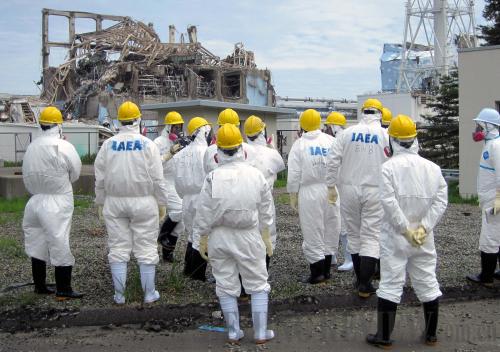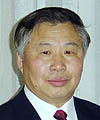|
 |
|
FACT FINDING: Nuclear experts from the International Atomic Energy Agency examine a damaged reactor at the Fukushima Daiichi Nuclear Power Plant on May 27 (XINHUA) |

Nuclear security has been on the agenda of many international conferences since a 9.0-magnitude earthquake in Japan caused severe radiation leaks at the Fukushima Daiichi Nuclear Power Plant in March. These conferences include the Fourth China-Japan-South Korea Leaders' Meeting in Tokyo and the Group of Eight Summit in Deauville, France. Nuclear security has become a pressing concern for the international community.
Mounting risks
The world has never encountered a nuclear security challenge as severe as the current one since mankind learned to utilize nuclear power for peaceful and non-peaceful purposes in the 1940s. The challenge confronts us in multiple forms.
It first takes on the form of nuclear accidents. Statistics of the U.S.-based Nuclear Energy Institute show as of June 2011, 29 countries worldwide are operating 440 nuclear reactors for electricity generation and 64 new nuclear plants are under construction in 15 countries. One consolation is that accidents of Level 1-7 on the International Nuclear Event Scale are exceedingly rare, but each accident that had occurred was astonishing in manifestation and each left a heartbreaking aftermath.
In the latest case of Fukushima, which hit Level 7, the highest level on the scale, no solutions have yet been found to address the disaster and it is almost certain areas within a 20-km radius of the plant will be uninhabitable. Furthermore, it will take several decades to fully observe damage to marine life.
A Greenpeace report in April 2006 said the world's worst nuclear plant accident, the Chernobyl meltdown in April 1986, caused 270,000 cases of cancer, killing 93,000, while several million were exposed to elevated levels of radiation. Areas within a 30-km radius of the plant are deserted and wildlife species there have visibly mutated. This disaster has caused the contamination and abandonment of thousands of square kilometers of land in Ukraine, Belarus and Russia. Even 34 percent of land in Britain was polluted to varying degrees.
The growing proliferation of nuclear technologies is another severe challenge. Many nuclear materials and technologies were smuggled due to management slackness during the breakdown of the Soviet Union in the early 1990s. It was reported a recent terrorist attack on a Pakistani naval base on May 22 might be the rehearsal for a future attack on Pakistan's nuclear arsenal, as the attack was only 24 km away from one of Pakistan's nuclear weapons bases.
One British expert said terrorists had launched attacks on three of Pakistan's nuclear facilities in the past five years. If terrorists obtained nuclear weapons and took revenge for the death of Osama Bin Laden, it could result in a death toll of tens of millions around the world, said a Russian nuclear expert. The Pakistani Taliban said on May 26 they had no plans to attack Pakistan's nuclear arsenal, but the credibility of the statement is doubtful. As a result, U.S. forces are attempting to gain direct control over Pakistan's nuclear weapons in case the Pakistani Government cannot guarantee their safety, which has made Islamabad nervous.
An international smuggling network of nuclear technologies and materials is active with the participation of individuals, groups and even governments. For instance, Pakistani nuclear scientist Abdul Qadeer Khan was kept under home arrest for years because of his alleged involvement in nuclear weapons proliferation.
In another case, it was reported a secret attack launched by Israel in September 2007 on a Syrian nuclear facility had caused deaths of 10 nuclear experts.
Nuclear tests are another concern. A few countries insist on developing nuclear weapons and carrying out nuclear tests in contravention of the UN's Nuclear Non-Proliferation Treaty (NPT) and Comprehensive Nuclear-Test-Ban Treaty. India and Pakistan launched five and six nuclear tests respectively in May 1998. North Korea proclaimed itself a nuclear power after it carried out two tests in October 2006 and May 2009.
It is even more worrisome North Korea has conducted nuclear tests in populous areas in Northeast Asia despite the fact all nuclear tests carried out by other nuclear powers were in deserts or on uninhabited Pacific islands. If a nuclear disaster occurs, the Korean Peninsula will be contaminated, leaving the Korean people nowhere to live, and its neighboring countries, China in particular, will suffer. North Korea's test location was only dozens of kilometers away from its border with China.
| 